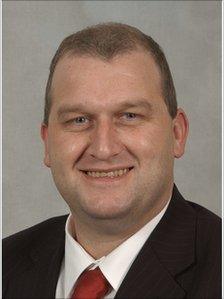Grasping the nettle of complexity
- Published
- comments

Carl Sargeant: "It's time to grasp the nettle"
As promised in the previous post, following much beavering away behind the scenes, here's a take on what comes next for local government in Wales - and it's pretty radical.
It's a stock question from journalists for successive Ministers responsible for Welsh local government - "do you believe there are too many councils?" Closely followed by "Will you rule out merging some or all of the 22 authorities?"
Labour gave a cast-iron guarantee at the last Assembly election that they would retain the current structure of 22 for their entire term of office. It would be about delivering improved services, not a costly and complicated mass reorganisation of structures.
They're keeping their promise - up to a point. At this stage, all 22 councils will be retained - but according to a blueprint approved by the Cabinet, the way they work will be radically changed.
Local Government Minister Carl Sargeant has told the Cabinet it's time to "grasp the nettle of complexity". While councils are starting to collaborate on services here and there, he calls it "pick and mix" with some working together with their neighbours in some areas, and going it alone on others.
So there's a new masterplan, external. There will be six new delivery areas, called "collaborative organisational groups" modelled on the Local Health Boards, give or take. New cogs in a old machine if you like.
Screw your eyes up a bit and look at the map and it starts to look very familiar. There's Cwm Taf, bringing together RCT and Merthyr Tydfil. There's Cardiff and Vale. And there's Swansea Bay, which is Swansea, Neath Port Talbot and Bridgend.
Mid Glamorgan, South Glamorgan and West Glamorgan anyone? And there's Gwent. Welcome back. It's as if 1996 never happened.
So what will be the upshot of these new lines on a map? The Welsh Government say that local authorities have asked them to take a lead in laying out how they see collaboration taking place. Fine, say ministers - here you go.
Government sources are adamant that this isn't reorganisation by the back door, as opposition politicians are claiming today. They say they're committed to local democratic decision making and accountability when it comes to everyday services that people rely on.
But the way the map is drawn and the rhetoric from Ministers, which frankly doesn't leave much room for doubt about they way they see this going, does raise a number of questions about how this will work in practice.
If there is a single social services department for Gwent - what happens if there is a serious failing in, say, Monmouthshire? Are councillors there responsible for scrutiny and monitoring of the service, or is it a joint scrutiny committee with members from all five authorities? In which case - how are local electors in Monmouthshire expected to hold their councillors to account if that particular issue was never discussed by the joint committee beforehand?
What about finance? At the moment, each council makes a decision on how much to allocate to each portfolio - education, transport, waste, social services and so on. Once those services are delivered jointly across two or more councils, how is the spending to be allocated and accounted for?
And a more fundamental question - what will be the point of all the councillors in one local authority assembling in one place for a meeting any more when the real decisions on services are being made at a higher level?

Dyfed Edwards: "The current structure is unsustainable"
It's easy to see why many councillors are likely to be deeply nervous at these plans. There are council leaders in Wales who are fairly relaxed about mergers - a kind of "let's get it over with" attitude. Dyfed Edwards, leader of Gwynedd has gone on the record to say he believes the current system is unsustainable, but also that the "Plan B" of wide-scale collaboration brings with it serious questions about accountability.
He can't see the point of wasting money and toil on constructing elaborate joint working structures when in the end someone, at some point, is going to have to grasp the real nettle of reform.
Other leaders are implacably opposed to any serious change. All of Wales's local politicians face elections in well under a year's time.
One of the first major pieces of legislation to be introduced into the new law-making Assembly will be a Local Government (Wales) Collaborative Measures Bill. It's still being drawn up, but it's a safe bet that it will contain provisions which will force recalcitrant councils to collaborate if they have refused to do so thus far.
There's a whole field full of nettles ahead.